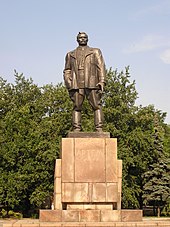Fyodor Andreevich Sergeev
Fyodor Sergeyev ( Russian Фёдор Андреевич Сергеев ; born March 7 . Jul / 19th March 1883 greg. In Glebovo, Kursk , † 24 July 1921 in the Tula Governorate ) was a Russian revolutionary. He was also known as Artyom .
Live and act
Fyodor Sergejew came from the family of a building contractor and was born in the Russian governorate of Kursk . He spent his childhood and youth in Yekaterinoslav . From 1892 to 1901 he attended technical secondary school there. In 1901 he switched to the Technical University in Moscow .
There he became a member of the Social Democratic Workers' Party of Russia (RSDLP) after just a few months . He took part in the student protests in 1902 and was forcibly de-registered, arrested and imprisoned in Voronezh prison for six months . After his release he lived in the Donets Basin , where he founded a social democratic circle at a coal mine there. He intensified his illegal work u. a. with the spread of Lenin's writings . In 1902 Sergeev left Russia and went to Paris to study at the Russian School of Social Sciences, where he also attended a series of lectures by Lenin. A year later he returned to his home country and started illegal work again in Ekaterinoslaw and in the Donets Basin region. From the miners there he received his party name (comrade) Artyom .
When he was released in early 1905, after his third term in prison, he went to Kharkiv on the instructions of the party . The Kharkiv workers elected him as their delegate at the IVth Congress of the RSDLP. All delegates were arrested by treason. In 1907 Sergeyev was sentenced to life in exile in eastern Siberia. In 1910 he came to Australia via Korea and China. There he continued his work and founded the Australian Echo newspaper for Russian worker emigrants.
After the February Revolution of 1917 he returned to Kharkiv and took over the chairmanship of the Bolsheviks in the city council, which was later called the City Soviet. At the same time he headed the Revolutionary Military Committee of the Kharkov Governorate . A few weeks later, Sergeev became chairman of the Central Committee of the SDLP in the Donets Basin region. In October he was called to Petrograd to take part in the armed uprising during the October Revolution .
Since February 1918 he was chairman of the council of people's commissars and commissioner for national economy of the Soviet republic Donets-Krivoy Rog . He was a co-organizer of the First Donetsk Army, which led its first battles against the new independent Ukrainian government and the White troops of General Kaledin . After several defeats, he managed to lead the army, now called the 5th Army, to Tsaritsyn and thus save it from complete annihilation. In 1919, Sergeev was Deputy Chairman of the Provisional Government of Ukraine and headed the defense of the Donets Basin against the troops of the white General Anton Denikin . Then he was chairman of the regional committee for the reorganization of coal production in the Donets Basin. As a member of the government of Ukraine , it was a special concern of his to revive the Donets region. In 1920/21 he supported Lenin against Leon Trotsky on trade union issues by co-signing Lenin's "Platform of Ten". Sergejew was a member of the party's central committee and thus belonged to the closest leadership circle in the Soviet Union. From 1920 to early 1921 he was secretary of the Moscow Party Committee and then chairman of the TKS miners' union.
He had a fatal accident on July 24, 1921 while testing an aircraft-powered railway wagon ( Aerowagon ) and was buried in a communal grave in Moscow by the Kremlin wall .
His son Artyom Sergeyev was adopted by Stalin .
Honors

- The Bobrovskaya coal mines in today 's Sverdlovsk Oblast were named after Artyom in 1921. The associated settlement was named Artjomowski .
- The Ukrainian city Bachmut was 1924-2016 Artemivsk .
- In 1924 a city founded in Primorye was called Artyom .
- In 1939 the place Olkhovsky in the Krasnoyarsk Territory was renamed Artyomovsk .
- Streets, squares and public buildings still bear his name in a large number of cities in Russia and Ukraine. A large number of monuments to Artyom were also erected.
literature
- Alexei Abramov. At the Kremlin wall. Berlin (East), 1984.
Web links
- Fyodor Sergejew (Russian)
- Biography of Fyodor Sergeev (Russian)
- Fjodor Sergejew at infodon.org.ua (Russian)
- Article Fjodor Andrejewitsch Sergejew in the Great Soviet Encyclopedia (BSE) , 3rd edition 1969–1978 (Russian)
| personal data | |
|---|---|
| SURNAME | Sergejew, Fyodor Andrejewitsch |
| ALTERNATIVE NAMES | Artyom; Сергеев, Фёдор Андреевич (Russian) |
| BRIEF DESCRIPTION | Russian revolutionary |
| DATE OF BIRTH | March 19, 1883 |
| PLACE OF BIRTH | Glebowo, Kursk Governorate |
| DATE OF DEATH | July 24, 1921 |
| Place of death | Tula Governorate |

